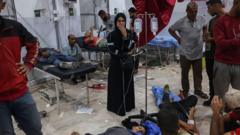Following a ceasefire between Iran and Israel, President Trump contradicts a classified U.S. intelligence report indicating that recent strikes only marginally hindered Iran’s nuclear ambitions, prompting confusion over the future of the region's stability and nuclear discussions.
Tensions Resurface as Trump Disputes Findings on Iran's Nuclear Threat Post-Ceasefire

Tensions Resurface as Trump Disputes Findings on Iran's Nuclear Threat Post-Ceasefire
As the Israel-Iran ceasefire stabilizes, President Trump challenges preliminary U.S. intelligence on the effectiveness of military strikes against Iran's nuclear program.
Amidst a fragile ceasefire between Israel and Iran, President Trump has publicly dismissed the findings of a preliminary U.S. intelligence report, asserting that American military strikes were far more destructive than suggested. As of June 25, 2025, both nations appear to be adjusting to peacetime again, but significant concerns about Iran's nuclear program remain at the forefront.
President Trump has stated that the classified analysis from the Defense Intelligence Agency claimed the recent attacks only delayed Iran's nuclear development by mere months, a claim he vehemently disputes, labeling it “very inconclusive.” Addressing the media at a NATO summit in the Netherlands, he reiterated that Iranian nuclear facilities faced "obliteration" and argued that Tehran was unable to relocate enriched uranium prior to the U.S. strikes.
The conflict, which reached an intense peak starting on June 13, concluded with both Israel and Iran asserting victory, followed by signs of stabilization in the region. Israeli authorities have lifted emergency restrictions, enabling the reopening of key infrastructure, including the Ben Gurion Airport, while the focus shifts back to ongoing operations against Hamas in Gaza.
Iranian President Masoud Pezeshkian also celebrated resilience during post-conflict rallies, mentioning a willingness to resume nuclear negotiations, underscoring the strategic significance of the ceasefire in future dialogues. Nonetheless, the first day of the truce faced disruptions involving alleged missile launches that both nations continue to dispute.
Both the Trump administration and military officials have come under scrutiny for their contrasting narratives regarding the strikes, with some congressional leaders demanding thorough briefings to clarify the situation following a delay. Concerns persist that the current military actions could inadvertently reinforce Iran's determination to develop a nuclear arsenal, as nations worldwide watch closely.
The implications of the strikes and their impact on Iran’s nuclear capabilities remain contested, with military authorities cautioning that much damage is yet to be fully assessed. The upcoming weeks will be critical for both diplomatic discussions and military evaluations as the global community seeks to navigate this intricate geopolitical landscape.
President Trump has stated that the classified analysis from the Defense Intelligence Agency claimed the recent attacks only delayed Iran's nuclear development by mere months, a claim he vehemently disputes, labeling it “very inconclusive.” Addressing the media at a NATO summit in the Netherlands, he reiterated that Iranian nuclear facilities faced "obliteration" and argued that Tehran was unable to relocate enriched uranium prior to the U.S. strikes.
The conflict, which reached an intense peak starting on June 13, concluded with both Israel and Iran asserting victory, followed by signs of stabilization in the region. Israeli authorities have lifted emergency restrictions, enabling the reopening of key infrastructure, including the Ben Gurion Airport, while the focus shifts back to ongoing operations against Hamas in Gaza.
Iranian President Masoud Pezeshkian also celebrated resilience during post-conflict rallies, mentioning a willingness to resume nuclear negotiations, underscoring the strategic significance of the ceasefire in future dialogues. Nonetheless, the first day of the truce faced disruptions involving alleged missile launches that both nations continue to dispute.
Both the Trump administration and military officials have come under scrutiny for their contrasting narratives regarding the strikes, with some congressional leaders demanding thorough briefings to clarify the situation following a delay. Concerns persist that the current military actions could inadvertently reinforce Iran's determination to develop a nuclear arsenal, as nations worldwide watch closely.
The implications of the strikes and their impact on Iran’s nuclear capabilities remain contested, with military authorities cautioning that much damage is yet to be fully assessed. The upcoming weeks will be critical for both diplomatic discussions and military evaluations as the global community seeks to navigate this intricate geopolitical landscape.























